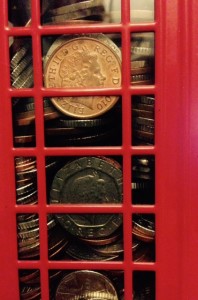
“Do you have anything smaller?” Music, meter and small change
Even though I haven’t used a laundrette in years, I can’t get out of the habit of holding on to 20p pieces for the dryer, just in case. Likewise, when I’m in Prague, my heart sinks when I realise that I’ve just taken out 2,000 Czech crowns at the ATM, because you’ll get a 2000 note, which is currently about £50. Try buying a bus ticket from the airport with that.
 Some ballet exercises, particularly those in a medium waltz tempo, are like a launderette where you need a whole bag full of assorted change for the various machines. It needs to be lyrical (notes), then accented (pound coins) then some detail for smaller movements (20p pieces), then some 50p pieces for the bit that’s strong and lyrical, but not so lyrical as the bit you paid for with a tenner, and then lyrical again, but with a strong beat. In other words, whatever accompaniment, dynamic or articulation worked for one bit of the exercise won’t work for all of it, and it’s never quite one thing or another, and you need to be able to keep it all going just under the surface, in case you need to accentuate a different level of the music suddenly.
Some ballet exercises, particularly those in a medium waltz tempo, are like a launderette where you need a whole bag full of assorted change for the various machines. It needs to be lyrical (notes), then accented (pound coins) then some detail for smaller movements (20p pieces), then some 50p pieces for the bit that’s strong and lyrical, but not so lyrical as the bit you paid for with a tenner, and then lyrical again, but with a strong beat. In other words, whatever accompaniment, dynamic or articulation worked for one bit of the exercise won’t work for all of it, and it’s never quite one thing or another, and you need to be able to keep it all going just under the surface, in case you need to accentuate a different level of the music suddenly.
The “ballet music waltz”
I’m calling this piece from Le diable à quatre a “little waltz,” or a “ballet music waltz” because that term is usually a sign that you need to get your laundrette money out: a waltz is just a waltz, a big waltz kind of plays itself, but a little waltz, or a “ballet music waltz” is like an overweight dachsund that you have to cajole, but not so much that it drags it’s tummy along the ground. I apologise in arrears for all the metaphors, but that’s the nature of the problem – this kind of music isn’t anything in particular, it’s a lot of things at once, and it doesn’t have a name, just a capability.
It starts at 11:09 in the clip above (it should start there automatically).
This little ballet music waltz has got it all: it’s lyrical, with the possibility of long phrases. it’s sometimes in 6, sometimes in 3 (which is a big deal: see my earlier post on the rarity of truly triple metre) sometimes subdivided, sometimes not, sometimes heavy, sometimes light, sometimes quiet, sometimes loud. What’s more, you can play it several different ways without sucking the life out of it.
As if that weren’t enough reasons to include in my year of ballet playing cards, I love the fact that you can hear echos of Giselle’s opening Act 1 solo (the G major 6/8 one) in this.
See also


Great site! If I hesitate over a waltz like this….it’s that it doesn’t go beyond being functional dance music and wouldn’t add much zing to an open class.
The reverse is the case of the Csardas which you transcribed or some ballet music which is outwardly similar to the above Waltz by Adam. For example, Delibes, Burgmuller ( one or two of the piano studies) and even Minkus have more potential. A subjective matter of course.
Hi Graham, thanks for the comment. I agree, it’s not a lot more than functional, and there are undoubtedly more interesting pieces – particularly by someone like Delibes, as you say. However, it’s the functionality that made me transcribe/post it, it’s a kind of Swiss-army knife that you could use for a problematic exercise. One of the reasons I post stuff like this is as models for improvisation, or tools for varying within the same meter, rather than necessarily using it straight off the shelf. No, it’s not the kind of thing that you’d do for an open class, but I would use it say in a company class where there was a particularly tricky exercise where nothing else seems to fit. It is subjective, but I think it’s also partly dependent on the situation – the right thing at the right time. At first hearing, Diable à quatre doesn’t jump out at me, but it does solve problems!